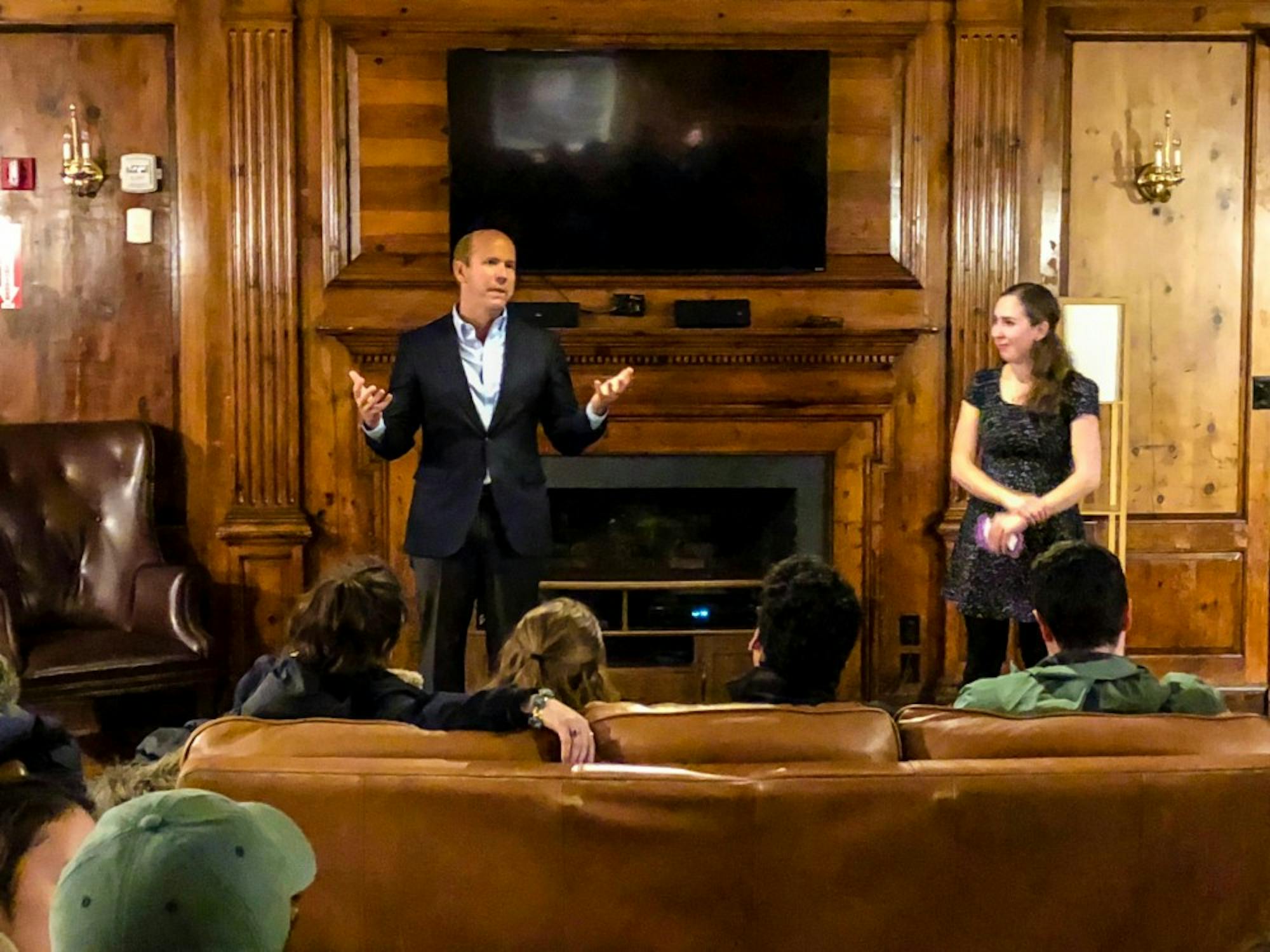Democratic congressman Rep. John Delaney of Maryland spoke at Beta Alpha Omega fraternity on Jan. 15 as part of his campaign for the Democratic presidential nomination. His speech comes less than one year into President Donald Trump’s tenure and three years before the next presidential caucus.
Delaney, who previously worked as an entrepreneur and founded two companies, has served Maryland’s sixth district in the House of Representatives since 2013. He announced that he was running in the 2020 presidential race on July 28, 2017 in a Washington Post op-ed, becoming the first Democratic candidate to declare his candidacy in the upcoming race.
Delaney is now on his fifth official visit to New Hampshire introducing himself to voters. In 2017, the campaign conducted 90 events in Iowa and New Hampshire, Delaney said. He added that the plan is to hold 400 events this year.
In his speech at Beta, Delaney focused on the future and aiding Americans left behind by rapid global changes. He addressed the country’s lack of upward socioeconomic mobility, emphasizing his belief in a basic social contract with an obligation among communities and citizens to prepare the next generation.
Delaney said during the speech that he plans to approve only bipartisan bills during his first 100 days in office and work to end gerrymandering.
Despite the duration of his campaign, Delaney claimed in the speech that he will not be taking money from political action committees, organizations created for the purpose of raising and spending money to elect and defeat candidates. Instead, he said he plans on funding his campaign through individual contributors and his own personal wealth.
During the question and answer portion of his speech, Delaney fielded questions regarding government financing, his support for the Deferred Action for Child Arrivals program, the fiscal trajectory of the country and equal access and affordability for education.
In response to a question on Yemen and global crises, Delaney said that the U.S. should maintain a moral standard pursuant on its own self-interest in stabilizing displaced areas and leading global coalitions.
Following the event, Savannah Liu ’18 said that it was interesting to see what Delaney had to say because he very eloquently explained his thoughts. As someone who is not active in politics, she said that it was a completely different experience hearing a politician’s intentions and getting their perspective in person rather than just reading about them.
Dartmouth College Democrats president Jennifer West ’20 said that the event was held at Beta because students feel more comfortable interacting with candidates on a personal level in spaces such as fraternities or sororities.
College Democrats member Alex Rounaghi ’20 said that one of the best parts of attending Dartmouth is that because New Hampshire’s primary is so politically significant, students have the opportunity to be involved and hear critical speakers.
According to Delaney and his team, the congressman is ranked the third most bipartisan Democratic congressman by GovTrack. This ranking is based on the percentage of his sponsored bills that have bipartisan cosponsors, compared to House Democrats in 2015. The Lugar Center’s bipartisan index for the 144th Congress — which polled for the same year as GovTrack’s analysis and which measures both how often a candidate sponsors legislation from the other party and how often the other party sponsors that candidate’s legislation — ranked him 53rd out of 427.
Delaney’s district encompasses the outer suburbs of Washington, D.C. to the entire western portion of the state bordering West Virginia. The district contains rural and conservative areas as well as the liberal, Democratic suburbs of Washington, D.C.
In an interview with The Dartmouth, Delaney said that he thinks of his broad district as America in miniature with its diverse needs, but with much in common.
Delaney also said that he believes the political landscape of the nation and the world is rapidly changing.
“[The president] is degrading our standing in the world and he is putting our men and women abroad — both our military and diplomats — at some risk by doing this,” he said. “He’s causing huge resentment against the American people.”
Government professor Linda Fowler noted in an email statement that Delaney is the second candidate to officially declare his intentions for the 2020 race — Trump was the first, filing and setting up a re-election committee early on in his term. She added that it is necessary for Delaney to begin campaigning early, given that he has little name recognition in most of the country.
Correction Appended (Jan. 18, 2018):
The Jan. 17 article "Presidential candidate John Delaney visits Dartmouth" has been updated to clarify the sources of Delaney's campaign funding.
Alexa Green is a junior from Boca Raton, FL. She is majoring in English, with minors in Arabic and Public Policy. After joining the newspaper her freshman winter, she served as a beat reporter covering Hanover & the Upper Valley. Following this position, Alexa became the associate managing news editor. Outside of the newsroom, she is a tour guide on campus, works for the Rockefeller Center for Public Policy, and conducts research in the English department. During her off term, Alexa worked for I.B.Tauris, an independent publishing house in London, U.K., editing and publicizing international relations and politics books. She is passionate about the ways in which policy, current events, history and journalism have interconnected roles in defining global issues.




